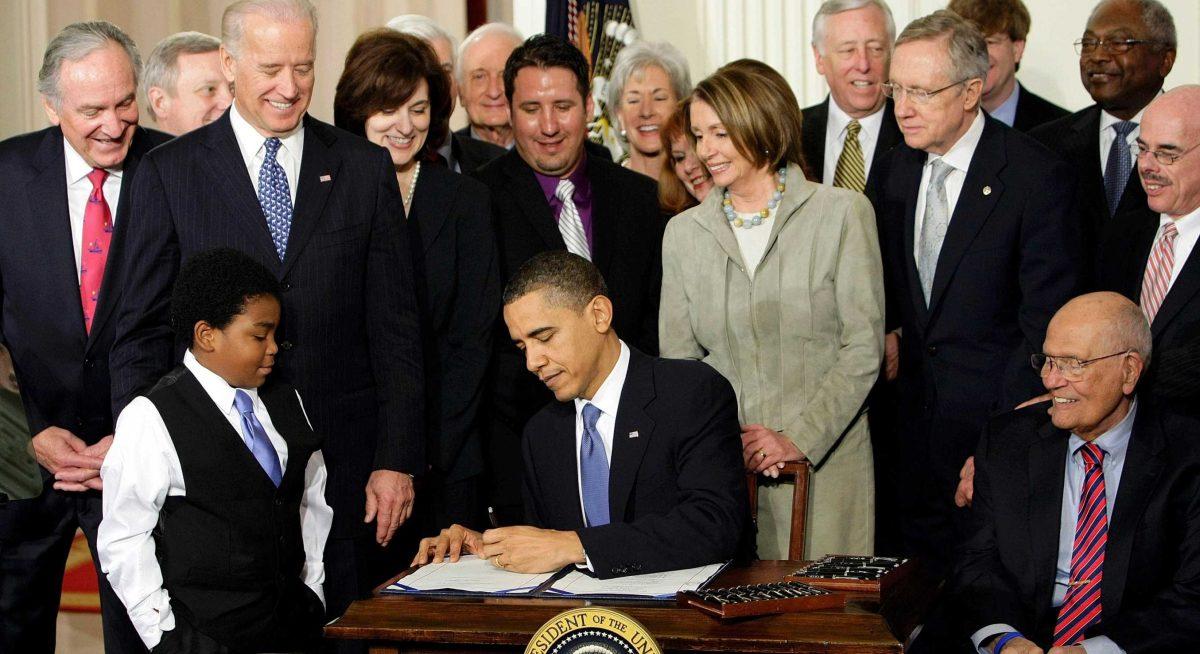One simple promise has proven undeniably effective at garnering support from conservatives in the last dozen or so Republican debates.
“I will repeal Obamacare.”
Few words carry as many negative connotations as the president’s health care plan, but in the face of vocal and often delusional critics, it’s no surprise Obamacare has turned into a dirty word.
The president’s health care plan has been criticized as everything from a socialist plot to destroy private enterprise to a conspiracy to cut costs through death panels and forced contraception.
In reality, Obamacare is a relatively benign piece of legislation that seeks to provide consumer’s protection from health insurance companies. The law helps the uninsured afford health insurance, prevents claim denials by insurers and fights discrimination based on preexisting conditions.
In fact, Obamacare is so benign that many universal health care proponents, including myself, feel while the law may be a step in the right direction, it ultimately falls far short of the universal health care system Americans need and deserve.
American citizens have a right to basic health care to better protect their inalienable right to life.
Obviously, there is no section in the Constitution or Bill of Rights that directly establishes this right, but the Founders recognized their own fallibility in the Ninth Amendment, essentially saying the rights of the people are not limited to those in our founding documents.
Citizens should enjoy a right to health care to protect their right to life in the same way they enjoy legal representation to protect their right to liberty.
If a citizen is accused of a crime and cannot afford representation, a lawyer is provided at taxpayer expense. The accused are granted representation because it provides them with the best possible chance to defend their rights to life and liberty in the face of false accusations.
Falsely imprisoning citizens unable to defend themselves for crimes they did not commit would constitute a failure of the state to protect their right to liberty because the citizens did nothing to deserve a suspension of their rights.
Similarly, citizens who require medical treatment to protect their lives from unforeseeable illness or injury deserve assistance from the state because they did nothing to put their lives in jeopardy.
A universal health care system is morally defensible under these rights, but it still faces some practical concerns.
Critics argue universal health care would hamper patient-doctor interactions and take away patients’ right to choose their doctors. In reality, a single-payer system would have minimal effects on patient-doctor interactions since a significant number of doctors are already paid through a single-payer system – Medicare.
Arguments over doctor choice also rest on the fanciful premise that patients currently enjoy the freedom to choose any doctor they want. Health insurers routinely determine the hospitals and doctors their customers can visit.
Many citizens are concerned a universal health care system would be economically unsustainable and point to the struggling Medicare system as proof. While Medicare is a single-payer system, it exclusively pays for the care of the elderly who generally have much higher health care costs than the rest of the population.
If the costs of their care were spread out over the rest of the population, costs would become much more manageable as younger citizens provide less drain on health care funds while contributing more.
“Death panels” was the Republican buzzword of the Obamacare debate, but anyone afraid of a shadowy council of accountants deciding who lives and who dies should look no further than the health insurance industry.
In 2007, 17-year-old Nataline Sarkisyan died of complications to leukemia after Cigna, her health insurance provider, refused to cover the cost of a liver transplant her doctors estimated would give her a 65 percent chance of survival.
Obamacare and universal health care will not create death panels. They might in fact help shut down a few.
Andrew Shockey is a 21-year-old biological engineering junior from Baton Rouge. Follow him on Twitter @TDR_Ashockey.
—-
Contact Andrew Shockey at ashockey@lsureveille.com
Obamacare protects consumers from insurance companies, needs to go further
March 21, 2012
President Barack Obama signs the Affordable Care Act on March 23, 2010, in the East Room of the White House in Washington. Supreme Court deliberations over the law will start Monday.





